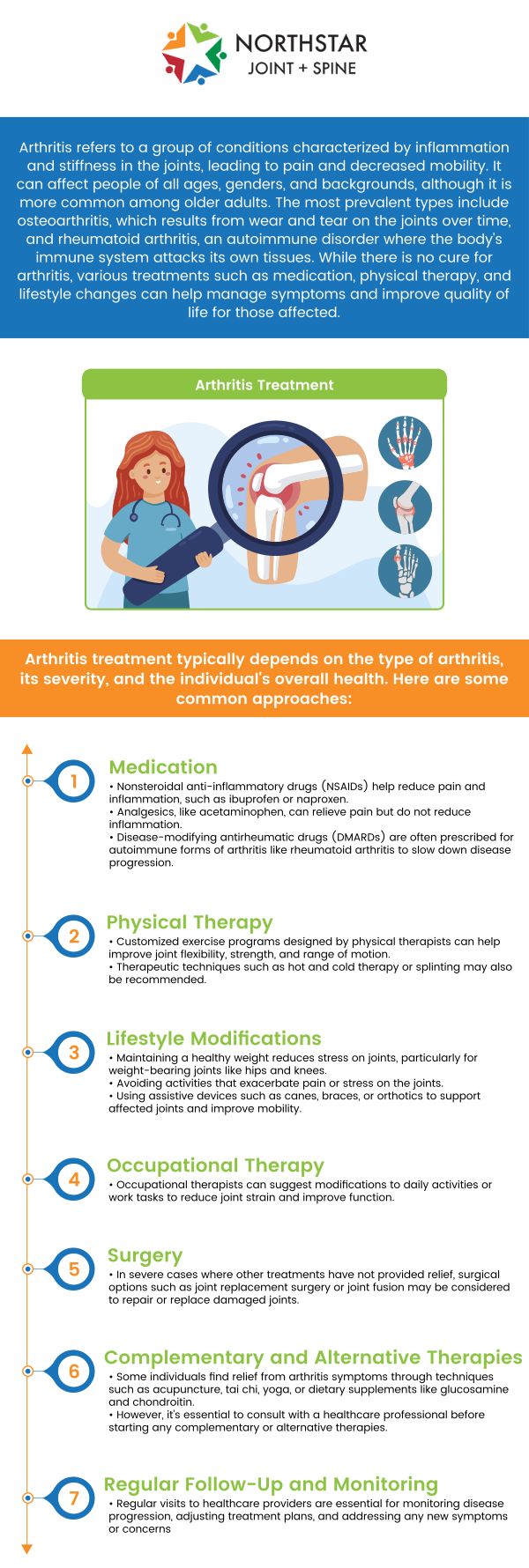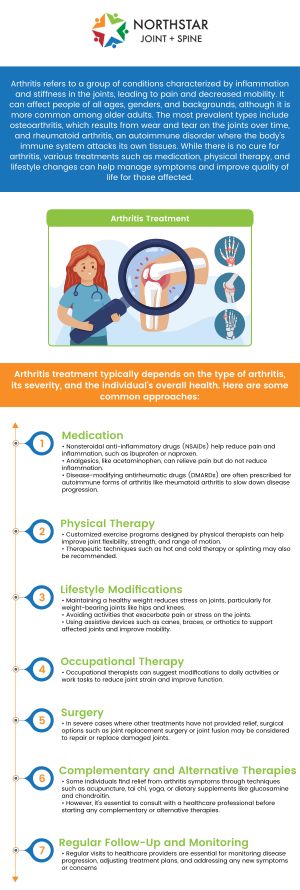What Kind of Diet is Best for Arthritis?
A diet focused on reducing inflammation can help manage arthritis symptoms. Board Certified Dr. Robert J. Nocerini, MD, at Northstar Joint and Spine, recommends eating foods that are rich in omega-3 fatty acids, such as fatty fish, along with plenty of fruits and vegetables. For more information contact us today or schedule an appointment online. We are conveniently located at 7704 San Jacinto Pl Suite #200 Plano, TX 75024.




Table of Content:
What factors contribute to the development of knee arthritis?
Is all inflammation bad?
How can food affect levels of inflammation?
What is an anti-inflammatory diet?
Foods that are part of an anti-inflammatory diet:
Foods associated with high levels of inflammation:
What about nightshade vegetables?
What about fruit and vegetable juices?
Do some foods need to be cut out completely?
Many factors can contribute to the development of knee arthritis, such as obesity, activity levels, or genetics. Many factors can also affect day to day levels of arthritis pain. One underappreciated factor is diet. Dietary choices have the potential to either aggravate or improve arthritis pain through changes in the levels of inflammation in the body.
The human body requires some level of inflammation for proper functioning. Our immune systems need inflammation to fight infections, and we also need inflammation to repair damaged tissues or maintain the regular functions of the body. Too much inflammation, especially on a chronic basis, can increase the risk of many chronic health conditions, such as heart disease, stroke, type 2 diabetes, some cancers, and arthritis.
The types of foods we eat can influence how much inflammation is present in the body, which can influence pain levels due to arthritis. Higher levels of inflammatory blood markers, such as c-reactive protein, may indicate excess inflammation in the body. A low inflammation diet may lead to lower levels of c-reactive protein and other biomarkers of inflammation.
An anti-inflammatory diet avoids foods that lead to higher levels of inflammation in the body and focuses on foods that lower inflammation. The typical Western diet consists of many processed foods and a large amount of sugar. These foods are associated with higher levels of inflammation, while diets resembling the Mediterranean diet are generally associated with lower levels of inflammation.
The Mediterranean Diet consists of cuisines from countries surrounding the Mediterranean Sea, such as Greece, Italy, Turkey, and Spain. The Mediterranean Diet is considered a type of anti-inflammatory diet.
The following foods are part of a Mediterranean or anti-inflammatory diet, and may be better options for people with knee pain due to arthritis:
• Whole Grains
• Healthy fats, such as those in olive oil, walnuts, and avocados
• Beans, or legumes
• Fish, such as salmon, sardines, mackerel, anchovies
• Poultry
• Fresh vegetables, such as broccoli, tomatoes, peppers
• Fresh fruit, particularly berries, such as strawberries, blueberries, and raspberries
Consuming greater amounts of the following foods can lead to higher levels of inflammation in the body, potentially worsening knee arthritis pain:
• Red meats
• Processed meats, such as cold cuts or bacon
• Refined or processed carbohydrates, such as pastries, cakes, cookies
• Bread or crackers made with white flour
• Foods high in saturated fats
• Foods high in added sugar
• Deep fried foods, potato chips
• Alcohol
Nightshade vegetables are tomatoes, peppers, eggplant, and potatoes. Some people believe these foods cause arthritis to flare up. There’s limited evidence to support this, but it is easy to test if these foods are worsening your pain by temporarily removing them from your diet, and then reintroducing them one at a time to see if your symptoms worsen.
While whole fruits and vegetables are healthy and part of an anti-inflammatory diet, squeezed or pressed juices do not provide the same benefits. Part of the value of eating whole fruits and vegetables lies in their fiber content. Fiber aids in slowing absorption of the natural sugars in the fruits and vegetables, so that the bloodstream does not get large spikes in glucose. Continued blood sugar spikes can contribute to chronic inflammation and lead to insulin resistance and even type 2 diabetes. When making a fruit or vegetable drink, it is best to blend them whole into a smoothie using a blender, rather than pressing or squeezing them. This preserves the fiber content and slows the absorption of sugar.
Ultimately, it’s important to shift the balance of foods to more healthy options, such as a diet that consists of more foods in the anti-inflammatory category, and that foods associated with higher levels of inflammation are minimized. Not only can this be beneficial for pain due to arthritis, but it may decrease the risk of other chronic diseases, such as metabolic syndrome, cardiovascular disease, and stroke. Contact us today for more information or schedule an appointment online. We are conveniently located at 7704 San Jacinto Pl Suite #200 Plano, TX 75024. We serve patients from Plano TX, Willow Bend TX, Frisco TX, Allen TX, Addison TX, North Dallas TX, and surrounding areas.






